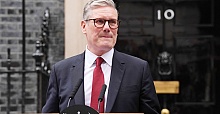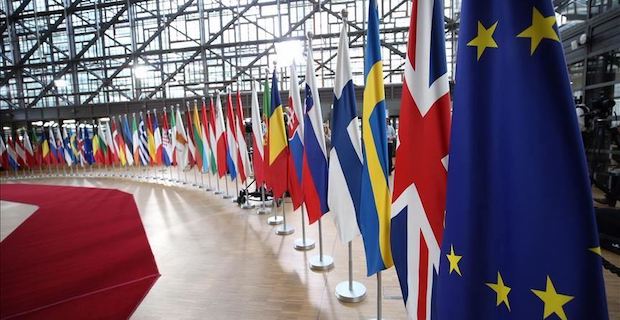A tumultuous week has seen Britain squeezed by both the U.S. and the European Union as London embarks on simultaneous trade talks with both economic powerhouses ahead of formally leaving the EU on Jan. 31. A proposed ‘digital tax’ on U.S. companies drew the ire of Washington, while Brussels made clear where it saw the balance of power between itself and London.
‘U.K. is only one country’
Irish Prime Minister Leo Varadkar and the EU’s chief Brexit negotiator Michel Barnier gave a joint press conference Monday. “If we have no agreement, it will not be business as usual and the status quo. We have to face the risk of a cliff edge, in particular for trade,” Barnier warned.
Varadkar told the BBC: “The reality of the situation is that the European Union is a union of 27 member states. The U.K. is only one country. And we have a population and a market of 450 million people. The U.K., it’s about 60 million. So if these were two teams up against each other playing football, who do you think has the stronger team?”
Financial services are crucial to London economically, but fishing rights are a politically sensitive issue despite not contributing much to the British economy in comparison. London wants both, but Brussels has other ideas.
Varadkar told the BBC: “If financial services and entertainment, audiovisual, are cut off from the single market, the European market, that will be a very severe blow to the British economy and the southeast, in particular in London,” he said.
“So you may have to make concessions in areas like fishing in order to get concessions from us in areas like financial services and that’s why things tend to be all in the one package.”
British Prime Minister Boris Johnson, through his spokesman, hit back by saying Britain would be “taking back control of our waters. We have been clear on that.”
Digital Tax
The U.K. is negotiating with the EU and U.S. simultaneously, with local media speculating that this is an attempt to play both sides off each other to gain better deals.
The American attitude has been capricious at best thus far.
"We've said that our goal -- your goal -- is trying to get [this] trade agreement done this year, and I think from a U.S. standpoint we are prepared to dedicate a lot of resources,” U.S. Treasury Secretary Steven Mnuchin told a public audience at Chatham House, a British foreign policy think tank, over the weekend.
Having won an initial phase agreement with China, U.S. President Donald Trump is particularly keen to score another deal with the U.K. – or at least something tangibly similar considering time restraints – before U.S. presidential elections in November.
“I’m quite optimistic. I think the prime minister and the president have a very good relationship,” Mnuchin said.
He was in London to meet with his counterpart, British Chancellor Sajid Javid. His visit came amid an escalating row over a so-called ‘digital tax.’
Javid wants a 2% tax on the revenues of digital platforms such as search engines, social media platforms and online marketplaces that turn a profit in the U.K. The tax could raise £500 million ($653 million) a year by going after companies such as Google, Facebook and Amazon.
“We plan to go ahead with our digital services tax in April,” Javid told Davos last week. “It is a proportionate tax. It is a tax that is deliberately designed as a temporary tax so it will fall away once there is an international solution.”
The U.S. has vehemently opposed such unilateral moves.
“The U.S. feels very strongly that any tax that is designed specifically on digital companies is a discriminatory tax and is not appropriate,” Mnuchin said.
“International tax issues are very complicated. They take long times to look at, and if people want to just arbitrarily put taxes on our digital companies, we will consider arbitrarily putting taxes on car companies.”
Javid, like Mnuchin, danced the line between hard and soft stances, telling Davos: “A trade agreement between the sixth largest economy in the world and the largest economy in the world could benefit all consumers in terms of jobs and prices. It’s hugely important.”
France had previously announced plans to introduce a similar tax but backed off in order for the Organisation for Economic Cooperation and Development (OECD), the most influential economic think tank in the West, to have time to work out a solution.
Like the threat to tax cars made in the U.K., the U.S. had threatened retaliatory tariffs on French cheese and wine.
British International Trade Secretary Liz Truss waded into the debate, saying: “U.K. tax policy is a matter for the U.K. Chancellor. It's not a matter for the U.S. It's not a matter for the EU. And it's not a matter for anybody else.”
Former U.K. Chancellor George Osbourne told the BBC: “It will be a very brave British government that walks into a trade war with the United States at the very moment when the centerpiece of its economic policy is to strike a trade deal with the United States.”
That the U.K. will negotiate with the U.S. and EU at the same time has not slipped past Brussels.
Barnier said London could not expect to be treated with the same “respect” by the U.S. on its own rather than as part of the EU bloc that had “500 million consumers and 22 million businesses.”
He was asked by French media if he feared a bidding war over the U.K., to which he curtly replied: “There will be no overbidding on our side.”
The U.K. will formally leave the EU on Jan. 31 and aims to strike a trade deal with the bloc by the end of 2020.


 Prime Minister Keir Starmer's 2025 Easter message
Prime Minister Keir Starmer's 2025 Easter message After Nesil Caliskan a by-election will be held in Jubilee ward in Enfield
After Nesil Caliskan a by-election will be held in Jubilee ward in Enfield Publishing the analysis, Labour’s Cllr Ergin Erbil said Everybody in Enfield deserves basic rights
Publishing the analysis, Labour’s Cllr Ergin Erbil said Everybody in Enfield deserves basic rights Gaza-Israel conflict Statement from Cllr Ergin Erbil, Leader of Enfield Council
Gaza-Israel conflict Statement from Cllr Ergin Erbil, Leader of Enfield Council The European Union called on Turkey to uphold democratic values
The European Union called on Turkey to uphold democratic values Turkish citizens in London said Rights, Law, Justice
Turkish citizens in London said Rights, Law, Justice The Council of Turkish Cypriot Associations Geneva response letter
The Council of Turkish Cypriot Associations Geneva response letter Sustainable Development and ESG, Will This Become the Course for Turkic World
Sustainable Development and ESG, Will This Become the Course for Turkic World The 'Prince of Paris' has impressed in his first EuroLeague season
The 'Prince of Paris' has impressed in his first EuroLeague season Saran Media And Euroleague Basketball Extend Media Rights Partnership for Four More Years
Saran Media And Euroleague Basketball Extend Media Rights Partnership for Four More Years Will Rangers be Jose Mourinho’s next victim?
Will Rangers be Jose Mourinho’s next victim? Jose Mourinho's Fenerbahce face Rangers on Thursday
Jose Mourinho's Fenerbahce face Rangers on Thursday Barclays has become the biggest UK lender so far to cut mortgage rates
Barclays has become the biggest UK lender so far to cut mortgage rates THE SPRING STATEMENT EXPLAINED, UK ECONOMIC OUTLOOK AND GROWTH FORECASTS
THE SPRING STATEMENT EXPLAINED, UK ECONOMIC OUTLOOK AND GROWTH FORECASTS Launch of Made in Enfield gift shop to celebrate local artists and designers
Launch of Made in Enfield gift shop to celebrate local artists and designers Trial used smart Wi-Fi sensors for live building occupancy data to optimise
Trial used smart Wi-Fi sensors for live building occupancy data to optimise
















